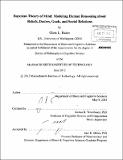Bayesian Theory of Mind : modeling human reasoning about beliefs, desires, goals, and social relations
Author(s)
Baker, Chris L. (Chris Lawrence)
DownloadFull printable version (12.52Mb)
Alternative title
BToM : modeling human reasoning about beliefs, desires, goals, and social relations
Modeling human reasoning about beliefs, desires, goals, and social relations
Bayesian theory of mind
Other Contributors
Massachusetts Institute of Technology. Dept. of Brain and Cognitive Sciences.
Advisor
Joshua B. Tenenbaum.
Terms of use
Metadata
Show full item recordAbstract
This thesis proposes a computational framework for understanding human Theory of Mind (ToM): our conception of others' mental states, how they relate to the world, and how they cause behavior. Humans use ToM to predict others' actions, given their mental states, but also to do the reverse: attribute mental states - beliefs, desires, intentions, knowledge, goals, preferences, emotions, and other thoughts - to explain others' behavior. The goal of this thesis is to provide a formal account of the knowledge and mechanisms that support these judgments. The thesis will argue for three central claims about human ToM. First, ToM is constructed around probabilistic, causal models of how agents' beliefs, desires and goals interact with their situation and perspective (which can differ from our own) to produce behavior. Second, the core content of ToM can be formalized using context-specific models of approximately rational planning, such as Markov decision processes (MDPs), partially observable MDPs (POMDPs), and Markov games. ToM reasoning will be formalized as rational probabilistic inference over these models of intentional (inter)action, termed Bayesian Theory of Mind (BToM). Third, hypotheses about the structure and content of ToM can be tested through a combination of computational modeling and behavioral experiments. An experimental paradigm for eliciting fine-grained ToM judgments will be proposed, based on comparing human inferences about the mental states and behavior of agents moving within simple two-dimensional scenarios with the inferences predicted by computational models. Three sets of experiments will be presented, investigating models of human goal inference (Chapter 2), joint belief-desire inference (Chapter 3), and inference of interactively-defined goals, such as chasing and fleeing (Chapter 4). BToM, as well as a selection of prominent alternative proposals from the social perception literature will be evaluated by their quantitative fit to behavioral data. Across the present experiments, the high accuracy of BToM, and its performance relative to alternative models, will demonstrate the difficulty of capturing human social judgments, and the success of BToM in meeting this challenge.
Description
Thesis (Ph. D.)--Massachusetts Institute of Technology, Dept. of Brain and Cognitive Sciences, 2012. Cataloged from PDF version of thesis. Includes bibliographical references (p. 127-139).
Date issued
2012Department
Massachusetts Institute of Technology. Department of Brain and Cognitive SciencesPublisher
Massachusetts Institute of Technology
Keywords
Brain and Cognitive Sciences.